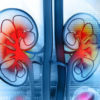Graves’ Disease Treatment in Northern New Jersey
 Hormones are fundamental to many functions of our bodies. Produced throughout the body in endocrine glands, hormones, and hormone regulation, are important aspects of physiology. The thyroid gland is found in the throat. It produces the thyroid hormone, which helps regulate body temperature, heart rate, and metabolism. Graves’ disease is an autoimmune disease related to the thyroid. The endocrinology department at Bergen Medical Associates offers Graves’ disease treatment in northern New Jersey.
Hormones are fundamental to many functions of our bodies. Produced throughout the body in endocrine glands, hormones, and hormone regulation, are important aspects of physiology. The thyroid gland is found in the throat. It produces the thyroid hormone, which helps regulate body temperature, heart rate, and metabolism. Graves’ disease is an autoimmune disease related to the thyroid. The endocrinology department at Bergen Medical Associates offers Graves’ disease treatment in northern New Jersey.
What Is Graves’ Disease?
First named by Sir Robert Graves in the 19th century, Graves’ disease occurs when the thyroid gland produces too much of the thyroid hormone. This level of activity and the ensuing oversupply of hormones is called hyperthyroidism. This thyroid disease is caused by the body’s immune system attacking the thyroid. The immune system malfunctions to the point it produces antibodies that trigger the overproduction and oversupply of hormones.
With too many thyroid hormones in the bloodstream, metabolism can accelerate, causing reactions throughout the body. Graves’ disease can negatively affect the heart and other organs, as well as bones and muscles. Patients who experience any signs or symptoms of Graves’ disease should schedule an examination with a medical professional. The board-certified endocrinology practitioners, nurses, and highly trained staff at Bergen Medical Associates are available for consultations with patients at locations throughout northern New Jersey.
What Are the Signs and Symptoms of Graves’ Disease?
Because Graves’ disease affects the metabolism, patients experience symptoms related to the amount of energy released into the body. Body functions become faster. Here are some signs and symptoms related to Graves’ disease:
- Rapid or irregular heartbeat
- Sweating and sensitivity to heat
- Menstrual cycle disruption
- Erectile dysfunction
- Low libido
- Trembling, shaky hands, and muscle weakness
- Nervousness and irritability
- Fatigue and trouble sleeping
- Unexplained weight loss
- Anxiety
- Eyes that bulge from the socket
- Light sensitivity
- Pressure or pain in the eyes
- Blurred vision
- Frequent bowel movements or diarrhea
- Enlarged thyroid gland, or goiter
- Rough, reddened skin
What Are the Risk Factors for Graves’ Disease?
There are several risk factors for Graves’ disease. This condition is more common in people assigned female sex at birth. Here are some other factors that increase the risk of hyperthyroidism and Graves’ disease:
- Age 30 or older
- Family history of Graves’ disease, or Hashimoto’s disease
- Postpartum Women
- Exposure to high levels of iodine
- Children with Down syndrome
- Children with DiGeorge syndrome
- High levels of stress
- Patients who receive highly active antiretroviral therapy (HAART)
- Type 1 diabetes
- Rheumatoid arthritis
- Celiac disease
- Lupus
- Autoimmune gastritis
- Vitiligo, a skin condition that causes some areas of skin to lose pigmentation
- Family history of autoimmune disorders
How Is Graves’ Disease Diagnosed at Bergen Medical Associates?
After a physical examination and thorough review of your medical history, the experienced medical practitioners at Bergen Medical Associates may order a few additional tests. These include:
- Blood tests to measure hormone levels and antibodies
- Thyroid scan with radioactive iodine to measure the activity level of the thyroid gland
- Doppler ultrasound to help visualize the thyroid gland and function
What Are Recommended Graves’ Disease Treatments?
While there is no cure, there are effective Graves’ disease treatments available to help manage the symptoms. For patients diagnosed with Graves’ disease, the endocrinology department at Bergen Medical Associates may recommend one or more of the following treatments:
- Anti-thyroid medications to prevent the thyroid gland from producing hormones
- Beta-blockers to help reduce anxiety levels and lower metabolism
- Radioactive iodine treatments, to destroy part or all of the thyroid gland
- Surgery to remove the thyroid gland
If the thyroid function is stopped, or if the gland is removed, patients are prescribed levothyroxine, which is a thyroid hormone replacement medication.
Schedule an Appointment for Graves’ Disease Symptoms
With convenient office locations throughout northern New Jersey, Bergen Medical Associates offers a variety of medical specialties. The approach is providing medical care for the whole person, with practitioners who collaborate in both diagnoses and treatments. Patients concerned about symptoms or requiring treatment for Graves’ disease can find help from the endocrinology department. For more information, contact us today.










